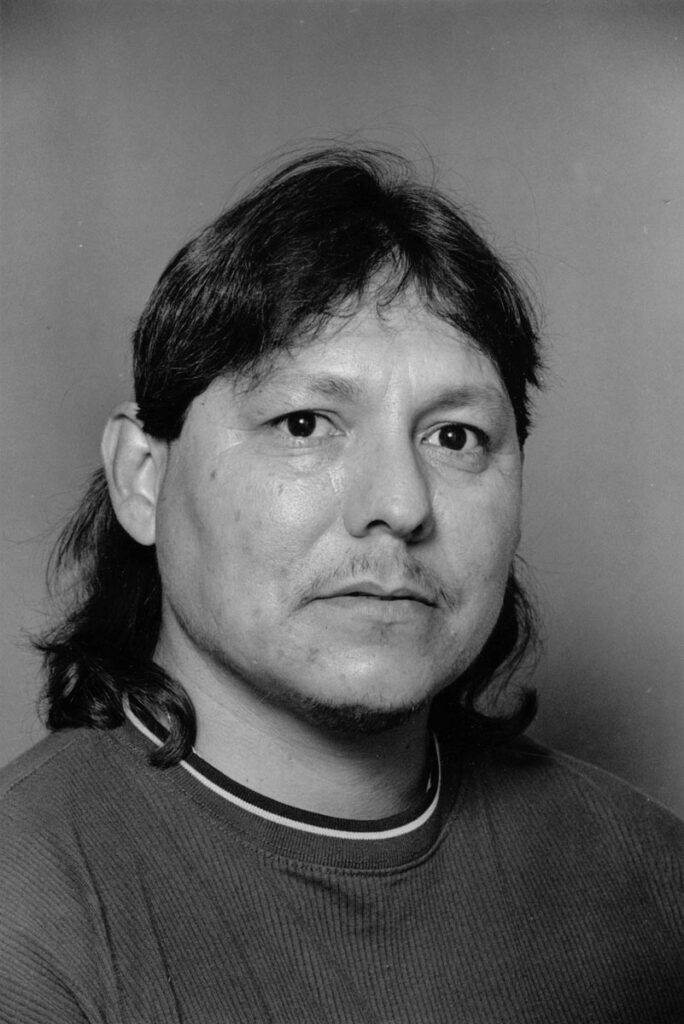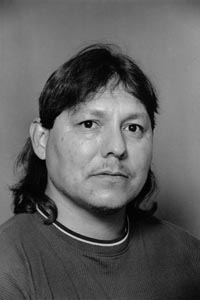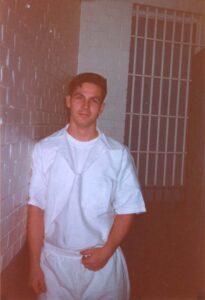As soon as Manuel Zuniga heard the news, the fate of his younger brother, Pablo, flashed before his eyes. A television station in Austin, Texas, was reporting that a young Hispanic man had been stabbed to death in the middle of the night on a secluded bike path that parallels Town Lake, the scenic river bisecting the city, just south of the state capitol building.

The victim wasn’t identified by name, but Manuel, then 36, knew that his 31-year-old sibling often walked that route to and from his apartment. A childhood battle with German measles had left Pablo deaf and mute, but he retained such a trusting disposition that Manuel often worried would make him a target. As much as he admired Pablo’s determination to be independent, he couldn’t help but fret about his safety. Clicking off the TV, he tried to concentrate on something else. A few minutes later, the phone rang. It was a friend, confirming his dreadful premonition.
“Because of Pablo’s disability,” recalls Manuel Zuniga of the July 1996 murder, “we were an especially tight-knit family, and we were always doing things to help make life a little easier for Pablo. We’d drive him to and from the bus. Even after he moved out of the house, I’d visit him every weekend to make sure he was okay. I was so proud of him: the way he managed to live on his own, how hard he worked. But I couldn’t watch him all the time. How could someone hurt someone like my brother?”
At least part of the answer to Zuniga’s question, which emerged during the police investigation, was chilling to Manuel and his family. Pablo had lived a surreptitious gay life; apparently he was targeted because he was homosexual.
After a two-month manhunt, detectives arrested Charles Edward Lowery, a 23-year-old drifter who police believed had come to Town Lake looking to rob and harass homosexuals.
Pablo Zuniga‚s murder was just one of at least thirty allegedly homophobic killings in Texas dating back to 1988, when an anti-violence group began tracking them. The crimes are as notable for their viciousness as their ubiquity. In 1993, for instance, three young men came across 23-year-old Nick West in Tyler, a town in eastern Texas. The men forced West into a car and drove him to a gravel pit ten miles outside the small town. They held him hostage for hours, terrorizing him with rocks, hunting knives, and their fists before shooting him nine times. Before local police tracked down the trio and placed them under arrest, one of West’s attackers boasted to friends that he enjoyed “fag-bashing.”
One year later, a gay man was stabbed 35 times by skinheads who would admit setting out that evening in Houston to “hurt a fag.” In another case, a homosexual resident of Irving, a city located between Dallas and Fort Worth, had his hands bound behind his back while he was repeatedly stabbed, his throat slit, and his genitals severed. In still another incident 1994, a man was stabbed in the chest and thrown through a plate-glass window at an Irving hotel. After he beat and shot Michael Burzinski to death in Houston that same year, one of the confessed killers, a high school football player, said he “felt like a judge” when he shot Burzinski in the back of the head.
Texas is not alone in grappling with violence against homosexuals. The nation recoiled in horror at the coverage of the brutal slayings of University of Wyoming student Matthew Shepard in 1998 and Billy Jack Gaither, an Alabama factory worker, the following year. According to the U.S. Department of Justice, there were more than one thousand physical attacks on gay men and lesbians in 1998, including more than a dozen murders. Gay men compose nearly twenty percent of all victims of bias-inspired crimes and are the group most likely to be murdered. The National Coalition of Anti-Violence Programs, a federation of 26 local organizations, annually reports at least twice the number of anti-gay incidents. According to the group, there were 1,965 attacks in 1999–a 20 percent decline from the previous year–including 29 murders.
While reports of violent crimes declining in many areas of the country during the past decade, anti-gay incidents have increased every year since the Justice Department began tracking crimes based on sexual orientation in 1992. Even these numbers may not tell the whole story. Researchers believe that many attacks are never reported, and some are never classified as a bias-motivated. The voluntary nature of the federal reporting system means that many are never included in national statistics.
Though the anti-gay assaults still represent only a small fraction of all the violent crimes in America, they have begun to provoke a lively and sometimes rancorous debate about the connections between prejudice, violence and prevention. I examined several killings in Texas and elsewhere in an attempt to understand what motivated them and how similar crimes might be averted in the future. These are some patters that emerged:
The violence generally takes place near identifiable gay meeting places—bars, bookstores, churches, neighborhoods, community centers, and parks.
Though perpetrators are rarely connected to anti-gay political groups, the attacks are often clustered in areas that have been bombarded by virulent anti-gay messages.
The incidents are striking for the ferocity of the attacks, a syndrome known as “homosexual overkill.”
Young men under the age of twenty-five, often in small groups, commit a majority of the crimes, describing their acts as a sort of male-bonding exercise, rite of passage, or “initiation.”
Upon apprehension, many perpetrators express bewilderment when they learn that the crime they committed may bring a long prison sentence. They often claim they were merely defending themselves from a sexual proposition by the victim.
Robbery is often cited as a motive. The residue of stereotype paints homosexuals as ideal victims: wealthier than the norm and physically unable to defend themselves.
The criminal justice system often treats perpetrators leniently, limiting the deterrent effect of punishment.
Because the incidents often take place near a bar or park known to be spots where men search for homosexual encounters, media coverage frequently focuses on the sexual circumstances of the victim and treats the allegation of an aggressive proposition as established fact.
For the most part, the Zuniga case dovetails with this model. Though only Lowery knows exactly what happened that dreadful night, the two apparently met shortly after Zuniga left the Chain Drive Club, a gay leather bar in Austin’s warehouse district. From there, he entered a lush, winding path that meanders along Town Lake. Secluded sections between the trail and the river have long been known as a meeting place for gay men looking for anonymous sexual encounters.
According to Lowery, he was sitting quietly on a park bench smoking a cigarette when Zuniga veered from the path and tried to grab the cigarette from his mouth. When Zuniga threatened him with a knife, Lowery pulled out his own knife and stabbed him in the chest. Zuniga was discovered early the next morning with his cut-off jeans and underwear around his ankles, his genitals exposed. His pockets had been turned inside out, indicating that robbery may have been a motive.
Manuel Zuniga, a stout man who favors cowboy boots and hats, hoped to gain a semblance of emotional closure at Lowery’s trial, which took place in November 1998. From Zuniga’s perspective, the trial got off to a troubling start when defense attorney Chris Gunter depicted Pablo as a sexual predator and Lowery as an innocent victim who happened to stumble into a homosexual cruising ground. Gunter claimed that Lowery stabbed Zuniga only as a last resort to fend off an aggressive sexual advance, a legal argument that has become so common in the criminal justice system that it has been dubbed the “homosexual panic defense.” Gunter also made much of the fact that Zuniga had been last seen leaving a gay bar and was hanging out at place known for anonymous sexual encounters.
Manuel says no amount of pleading from him and Pablo’s friends, all of whom argued strenuously that Pablo’s disability would have made him an unlikely candidate to threaten the street-smart Lowery, could move the jurors. “I could see it in their eyes,” says Zuniga, who testified for several hours. “Once they knew that my brother was gay and had been at that bar, they were not going to take the charges against Lowery seriously.”
After listening to just three days of testimony, it took the jury only three hours to acquit Lowery of first-degree murder. Instead, he was found guilty of tampering with evidence for discarding the murder weapon in a dumpster.
The judge sentenced Lowery to a five-year suspended sentence. Lowery was a free man.
Manuel Zuniga believes that Pablo, on his way home from the bar, was simply at the wrong place at the wrong time. But Dianne Hardy Garcia, executive director of the Lesbian/Gay Rights Lobby of Texas, a political group based in Austin, believes Zuniga’s slaying illustrates a far more complicated problem.
In a warren of small rooms in their Austin headquarters, her group maintains a thick file of cases dating back to 1986, when Texas Judge Jack Hampton, in a now notorious sentencing, went easy an eighteen-year-old whom with a pal had shot to death two gay men. Chastising the victims from the bench for allegedly attempting to pick up teenage boys for sex, Hampton explained the light sentence on the grounds that “prostitutes and gays are on the same level. I’d be hard put to give somebody life for killing a prostitute.”
The murders have taken an emotional toll on the peripatetic Garcia, for whom several have become personal crusades. She describes the Zuniga case as one of her greatest frustrations because she was never able to generate media coverage about it, a key aspect of her campaign to combat what she sees as the persecution of gay men and lesbians in Texas. “By the time of the Zuniga killing, there had been so many murders, they had become almost routine,” she says. “Reporters no longer saw the novelty or the scandal of it all.”
Hardy-Garcia believes the underlying sexual circumstances of the crimes are the biggest impediment to achieving justice for victims. “The anonymous pick-up is a result of the culture in which we live,” she explains. “It’s not safe to be gay in ordinary life, so guys go out to the bars and these parks, to socialize, to meet other guys. But these places have become known, and because of the increased visibility of the gay community, there is a lot of anger out there. These guys like Lowery know where to find their victims.
“It’s a very explosive situation, and the criminal justice system has not learned to separate the issues and see the real crime for what it is: premeditated murder.”
Indeed, the secrecy of the victim’s lives complicates every aspect of the crimes. Growing up in a close Catholic family in Falfurrias, a rural town of 6,000 residents in southern Texas, Manuel says that the Zuniga family was unaware of the very existence of homosexuality. Gay men and lesbians were never a topic of conversation that he can recall, and he never suspected that his little brother might be gay. “Pablo had so many things going on, being deaf and unable to speak and struggling to make a living, that it was hard to imagine that he was different in another way as well,” he says. “Even to me, and by then I knew some gays, it was just inconceivable.”
Even though Lowery and other perpetrators never have been linked to far-right political groups, Hardy-Garcia and other gay activists believe that the anti-gay political climate of Texas is at least partly to blame for the slayings. They point out that the brutal murders have taken place as the religious right, which preaches a virulent anti-gay message, has reached its greatest ascendancy in Texas politics. In Harris County, for instance, religious conservatives successfully lobbied the Republican Party to declare in its platform that homosexuality “leads to the breakdown of the family and the spread of deadly disease.”
Though Manuel eventually came to terms with his brother’s homosexuality, he knew all too well what others would think of it. Throughout the two and a half-year ordeal, Manuel hid the facts of the case from his elderly parents. “It was bad enough that Pablo was killed the way he was, but if our parents had known the real circumstances, it would have killed them too,” he says.
The strategy failed. Manuel believes that the death of his father from a heart attack in 1998 shortly before the trial—was precipitated by stress from the murder.
As a result, Manuel assumed the role as his brother’s champion without the support of his family. Revenge fantasies dominated his mind. “At first, I wanted to kill Lowery,” he says. “I wanted to make him suffer the way he made my brother suffer. Not long after the verdict, I went looking for him. Let’s just say I’m glad I didn’t find him. Then I wanted to shoot myself.”
Gradually, Zuniga and his girlfriend have returned to ordinary life in Georgetown, a middle-class suburb of Austin, where he runs a flourishing homebuilding business. A grief support group called For the Love of Christie, at which survivors of victims of violence share their stories, has helped him mourn the loss of his brother. “At some point, you just have to trust that God will take care of things, that he will punish Lowery when the time comes,” he says.
But moments after uttering those words, Zuniga confesses that he still finds himself overcome by rage. “Lowery got away with murder,” he says. “My brother could not have threatened him. I know that for a fact. I’m never going to let him forget that what he did to my brother was wrong. I’m going to keep talking about it until the day I die.”
©2001 Chris Bull
Chris Bull, Washington correspondent for The Advocate, is examining anti-gay violence in America.


